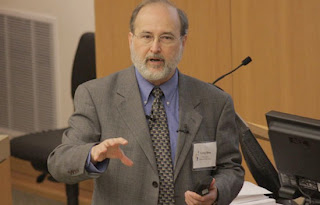{jcomments on}Originally posted July 14th at dowser.org
Contributor: Julian Brookes
Starting today, we’re going to check in regularly with big thinkers in the field of social innovation. We want to know what they’re working on, what questions they’re wrestling with, and what opportunities and challenges they see up ahead for the sector.
First up, J. Gregory Dees—professor at Duke’s Fuqua School of Business, director of the school’s Center for the Advancement of Social Entrepreneurship, and often referred to as the “father of social entrepreneurship education.” He’s the coauthor and editor of several books on social innovation, and he’s at work on another, due out next spring. Read on for highlights from our conversation.
On why social entrepreneurship is essential for solving social problems: “Social and environmental problems tend to be shifting and complex. To solve them you need context-specific knowledge—as well as creativity and motivation—which is scattered among private citizens. Social entrepreneurship allows us to tap into that.”
On government’s limitations as a problem-solver: “We don’t know in advance what’s going to work, which solutions are going to be most cost-effective, which are going to work best in which circumstances. The only way to know that is by have lots of different experiments going on, and that’s something governments are ill-equipped to do.”
On businesses’ limitations: “Many of the large firms that make up our markets are investor-owned and have a responsibility to deliver profits to their investors. But most of the experiments to find solutions to social problems are not going to meet that financial threshold, and that’s where we need social entrepreneurship—to fill the gap.”
On his current project: “I’m writing a book that argues that social entrepreneurship is just as important to the health of society as business entrepreneurship is for the health of the economy. It’s for anybody interested in helping create a healthy environment for social entrepreneurship—and that includes policy makers, funders, educators, and citizens.”
On the need (still) to make the case for social entrepreneurship: Those of us in the field may not realize it, but there are still a lot of folks out there who see social entrepreneurship as nice but not that significant, maybe even as a passing fad. And a related worry I have is that, as new as the concept is, it’s old for some folks, and they’re looking for the new, new thing—something else, like, say, impact investing. We still have a case to make for why social entrepreneurship is essential.”
On social entrepreneurship’s Catch-22: “If people assume that social entrepreneurship is marginal, that it doesn’t really scale, then they don’t make the effort to do the policy changes to get large-scale successes. In other words, they’re not going to invest in the ecosytem to support them. And that’s a problem. We’re going to need the ecosystem if we’re going to have large-scale successes to point to. It’s a bit of a Catch-22.”
On the ecosystem for business entrepreneurship (a telling contrast): “How many businesses would start from scratch and go to scale if we didn’t have venture capital? If we didn’t have banking and financial infrastructure to support business growth? If we didn’t have business schools? We have a very elaborate support structure for business entrepreneurs. How well would they do without it? My guess is not so well. Without something similar for social entrepreneurship, we can’t expect to see the same kind of scaling and impact.”
On the need for better ways to measure social impact: “We badly need greater clarity and transparency in performance evaluation and assessment. That would give skeptics confidence that we’re achieving the impact we’re claiming to achieve. But that’s a small piece of a larger puzzle. We need improved legal structures, better financial mechanisms, better pipelines for talent, and more directed education and training. We need all of that, and a culture that understands social entrepreneurship and supports it.”
On the idea that the U.S. lags behind other countries in social entrepreneurship: “I don’t know how to do those comparisons. We’re talking about very different contexts, very different social problems and needs. There are some very exciting things going on outside the U.S., and to some extent the pressing needs in other places may open the door to new kinds of innovation, like the use of cell phone technology to solve problems related to rural poverty and to link it to microfinance. But there’s a lot of creative, exciting stuff going on in the U.S.”
Thanks again to dowser.org for this contribution.
Photo: Nathan

